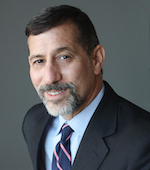Academic Spotlight: Prof. Bruce Hoffman
 Professor Hoffman was a freshman at Connecticut College in 1972, watching the Summer Olympic games, when the Munich Massacre began to unfold. “All of a sudden the Olympic games were hijacked…It was the first time I really noticed what terrorism was,” he described of the terrorist attack, which resulted in the deaths of eleven Israeli Olympic team members.
Professor Hoffman was a freshman at Connecticut College in 1972, watching the Summer Olympic games, when the Munich Massacre began to unfold. “All of a sudden the Olympic games were hijacked…It was the first time I really noticed what terrorism was,” he described of the terrorist attack, which resulted in the deaths of eleven Israeli Olympic team members.
Moved by the power of the incident to change the entire course of the event, he later began studying terrorism as a graduate student at Oxford University. At a time when most students were studying strategic nuclear issues in light of the Warsaw and NATO Pact—what he describes as “confrontation in a conventional sense”—Professor Hoffman remained fascinated by the influence of terrorism. In 1977, when France arrested Abu Daoud, the mastermind behind the Munich Attack, and violated extradition treaties with Israel and west Germany by refusing to let the terrorist go, Professor Hoffman found himself questioning, “What is it about terrorism that has this power to cause governments to go back on their word and to break treaty agreements that they wouldn’t have done with an ordinary criminal?”
His curiosity prompted him to pursue studies in terrorism and insurgency, an area which he has now studied for the past forty years. The career path he has taken since his years as a student has been marked by determination in the face of danger. At the time when he first began his studies, he described, “Few scholars had even met terrorists, few had been to the conflict zones. It was something that was done from the safety of university libraries.” With a laugh, he continued, “I suppose retrospectively, really stupidly, I decided to go to these conflict zones firsthand.”
He added, “Thirty-seven years ago, for instance, I went to live in Israel…I spent every day in the Arab quarters trying to learn Arabic and travelled extensively around the West Bank and the Gaza strip.” His prioritization of field research, which includes extensive work in Sri Lanka and Northern Ireland, has been identified as a factor which distinguishes him from other scholars.
Professor Hoffman would continue on to become a globally recognized terrorism expert, holding the Corporate Chair in Counterterrorism and Counterinsurgency at the Rand Corporation—a global policy think tank—writing critically acclaimed books, acting as Scholar-in-Residence for Counterterrorism at the Central Intelligence Agency in 2004, and coming to Georgetown in 2004 to teach as a professor and serve as Director of the Center for Security Studies and of the Security Studies Program.
Although he will be stepping down from his position as Director of the Center for Security Studies at the end of the semester due to his upcoming sabbatical leave, Professor Hoffman explained that serving as director has been the most impactful experience in his career. “Working with the faculty and the staff and the students and building something that really served the needs of our students in a way that either propelled their career forward or opened up the door for their careers: I think that has really been the most meaningful.”
During his sabbatical leave, Professor Hoffman will work on his next book, which involves research in archives in California, Britain, and D.C. The upcoming book will act as an analysis of America’s first war on terrorism during the Reagan administration in an attempt to illuminate lessons from that period which could be applicable to today.
When asked what he liked to do in his free time, Professor Hoffman let out a thoughtful sigh and chuckled as he responded, “I’m working almost all the time is the sad truth.” Nonetheless, what hobbies and passions he does pursue in his spare time is a compelling story on its own. He described, “I like music a lot, especially live music.” He professed to be the least musical person in his family—his son plays the guitar while his daughter is very good at singing—but at the moment, he is trying to learn to play the piano. As a big dog lover, he spends a lot of time with his labradoodle and he also confesses that he immensely enjoys writing—whether articles for his academic work or long commentaries on subjects he is passionate about on Facebook.
Professor Hoffman’s love for films is particularly pronounced: having lived in Los Angeles for 14 years, he described that watching films is a big part of his life. He concluded that he also enjoys hiking, particularly in the desert or in Scotland, “which is two very different environments,” he added. It was a statement that only served to underscore a truly unique personality: a terrorist expert with a deep-rooted appreciation for the arts.

Bohesa is a freshman in the School of Foreign Service who plans on majoring in International Politics. She loves lounging around coffee shops with friends, reading historical fiction novels, and watching too many crime shows for her own good. Currently, she is interested in policymaking (environmental policies in particular) and hopes to do some humanitarian work in the future. She has enjoyed writing for her school paper since middle school and is greatly excited to continue her interest in journalism by writing for The Anchor.
